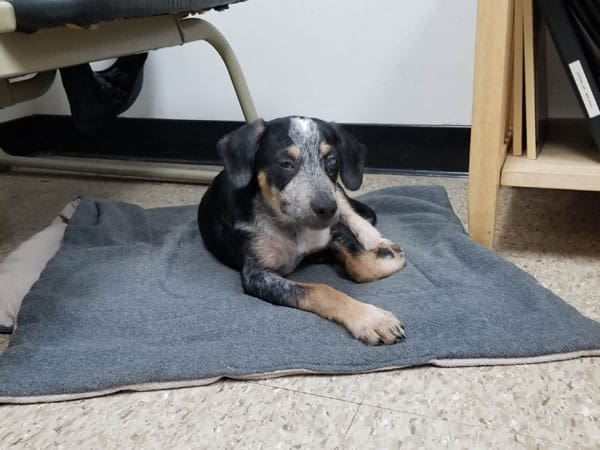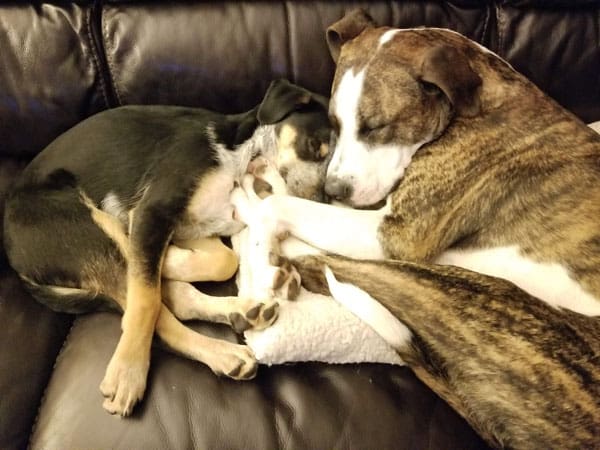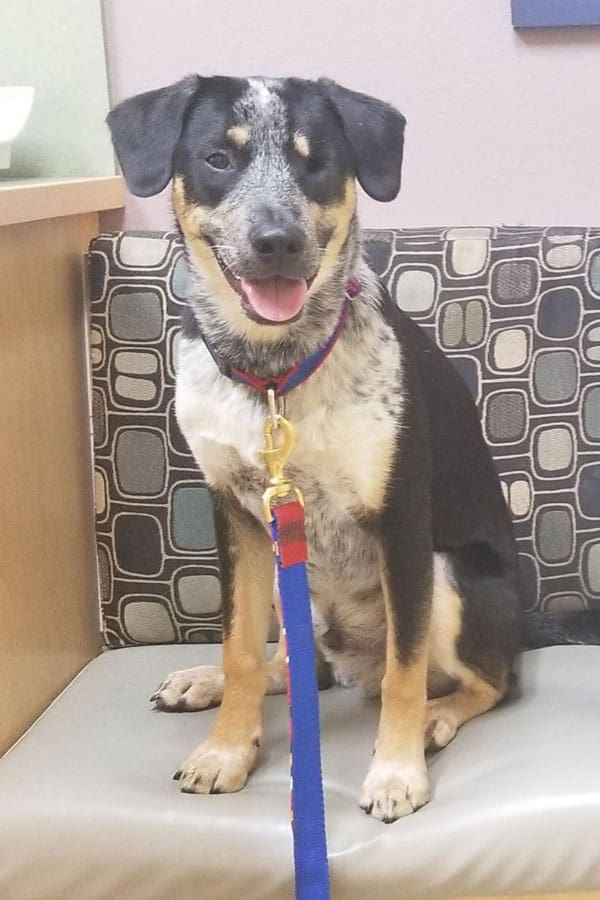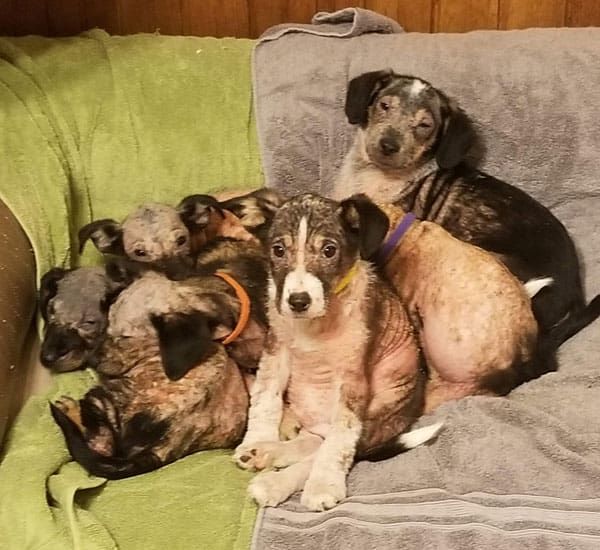“Why don’t you just keep him?”
Everyone who fosters dogs for a shelter or rescue group has heard some version of this, probably every single time they foster:
“That puppy is so happy with you! And he gets along with your dogs so well! You should keep him!”
“I can’t believe the transformation! He looks so gorgeous now, and is so well behaved! You should keep him!”
And the clincher: “That dog loves you so much! You should keep him!”
Why we can’t just keep them all
Here’s the thing: We who foster know that our foster dogs look better, feel better, are happier and healthier, and are better behaved than they were when we got them; that’s why we foster. And we are acutely aware of how much our fosters seem to love us. We, sometimes quite painfully, love them, too. But for most of us, if we keep our foster dogs, it means we can’t foster any more. So the next time for the next few years that our local shelter or rescue group calls, looking for a foster provider for another very needy but worthy dog or litter of starving puppies, we have to say, “Sorry, I can’t.”
“But what is just one more?” our friends ask. Well, when it comes to just one more mouth to feed, truthfully, it’s not that much. But every dog owner should be aware that the price of feeding a dog is just the tip of the iceberg of a dog’s total costs.
Veterinary and insurance costs add up quickly
Veterinary costs, especially for any emergencies, can completely sink a household budget. I’m a strong believer in pet health insurance, and it has saved me thousands – but there is the matter of the monthly payment and an annual deductible. As an example, I’m currently paying $60.05 a month for 3-year-old Woody’s insurance ($720.60 for the year), and $147.38 a month for 11-year-old Otto’s insurance ($1,768.56 for the year). Both have a $250 annual deductible; I pay the first $250 of veterinary expenses each year, and then the health insurance reimburses me for 90% of the rest of that year’s veterinary bills. So, my cost each year, before I qualify for any reimbursements, is $2,989.16. The cost for one more young dog’s health insurance would be at least the cost of Woody’s: $970 before the insurance would reimburse me a penny.

Does that sound like a fortune? Well, it is. But it’s a monthly bill I can budget for – whereas a $6,000 bill for emergency surgery or a $10,000 bill for cancer treatments would be quite a blow. One can gamble with these things, but it’s just that, a gamble. And I don’t like gambling when my financial stability and emotional health are riding on the outcome.
Don’t forget about boarding or pet sitter costs
Then there is the cost of care if and when I travel. If I needed to board my dogs, the difference between boarding two and three is significant. My local boarding options charge anywhere from $45 a day per dog for a jail-like kennel and no extras, up to about $75 a day per dog for a nice facility that takes the dogs out several times a day. So one more dog would add $315 (for the jail) to $525 for a week of boarding.
Truthfully, I haven’t ever boarded my dogs or used a professional pet sitter (another option). I rely on friends and family for help taking care of my dogs when I travel – and in return, they can count on me to help them when they need it. Providing care for extra dogs can be time-consuming when time is at a premium, but it’s the deal we make with each other to ensure that our dogs are as safe and as secure as possible, with people they know and love, when we need to travel, whether for work or family emergencies or, every once in a blue moon, an actual vacation!
When my husband and I leave town, my senior dog Otto always goes to stay with my sister and her husband; he loves being the big dog in her pack of little dogs, and the plush life they enjoy. (On his first stay with them, he staked out the queen-sized bed in their spare bedroom as his preferred sleeping spot, even though he had access to lovely sofas and heaps of dog beds. No other dog gets that privilege! But his “Aunt” and “Uncle” love him and allow it, and I love them for it, even though he’s not allowed on my beds at home!)
I generally leave Woody at my office/house, and my tenant there feeds him and lets him outside. (I actually provide food and other supplies for his dog, so that’s a favor my tenant owes me.) Another friend, who walks dogs with me a lot and knows all about Woody’s training and proclivities and the trails where it’s safe to go, will stop by and pick up Woody to take on walks with her dog; so I owe Jessie some favors after she helps keep Woody happy when I’m gone.
It takes a village
Since I took on the ask of fostering my current foster pup Odin and his siblings back in November, I have had to call in even more favors for Odin’s care than for my own two dogs. An eye condition meant Odin needed eye medication many times daily for months and months, so when I traveled, the management and logging of all of those eyedrops fell to my friend Leonora – the one person I knew who was comfortable with administering eye medication and able to do it as many times as required.

Ultimately, all of our efforts failed, and Odin’s eye was finally surgically removed, but he still requires more consideration when I leave town than my own dogs do. Odin is still very much in the adolescent “Fail to give me enough stimulation and I will chew anything I please” stage, so, in the past few months when I have traveled, I have had to call in yet more favors to keep him out of trouble. Leonora picks him up from my office/house on her way home from work, and he plays and sleeps with her dogs at night and on the weekend. He has shown that he can’t quite be trusted not to chew up stuff if left at her house during the day, but he’s perfectly happy and mostly nondestructive if he hangs out with Woody at my office, so my friend drops him there on her way to work each morning. That’s a LOT of favors I owe her after each trip.
Like me, Leonora loves and enjoys Odin, too. But she also has two dogs and two pet health insurance bills each month, and her older dog needs costly medication each month. She also pays for a pet-sitter to come to her house each day to let the older dog (especially) have a mid-day potty break. She would love to adopt Odin, but, like me, is concerned about the cost of adding another dog to her household.
Foster-failure trouble
I can usually easily dismiss the “You should keep him!” comments I get from family and friends and the people I am trying to promote my foster dogs to. I know they are well-meaning, and that, sentiment aside, most people understand that the commitment of a pet can’t be taken on that lightly. But a discussion I had last night with an acquaintance who is having a very hard time with two sibling foster-failures made me decide to just put this little tirade out there, anyway.
This woman is retired, and has two elderly dogs with complicated medical needs; both are former foster dogs who needed so much care that she ended up keeping them. Recently she fostered a mama dog and her puppies for a local rescue. The mama dog and the other puppies got adopted, but she just fell in love with the last two puppies, and they seemed to play so well together that she thought, well, they can keep each other company.

But now that they are in adolescence, they are starting to aggravate each other, and are also bothering her older dogs. She has sought out help from a professional trainer, but still feels overwhelmed. My friend is both kicking herself about making the decision to adopt them, and feeling desperate and heartbroken at the idea of re-homing one or both. She is in actual, physical pain at the idea of letting one or both of these pups go – and I totally get it. When I just think about saying goodbye to Odin – when I find the perfect home for him – I start to cry. I think back to what he looked like in November: a scabby, hairless, skeleton. How could I forget our many trips to UC Davis, trying to save his eye, and the many vets and vet students he charmed and delighted there. I am going to miss his habit of burying his head in my chest and leaning in for long, sweet hugs.
Finding a forever home that’s just right
My acquaintance and I both know that these dogs can be happy elsewhere. And I think that we both know that they should live elsewhere. I can’t speak any more for her, but I know that I will be supremely happy when I can find a home for Odin where he will get more individual attention and love than he can get with me. It hasn’t happened in the past few weeks because I am being crazy-picky about who is going to get him. I want to make sure he ends up in a home with people who truly have time and space and a budget for a dog, and who will be just as touched by his cuddling and amused by his zoomies and appreciative of his gentle friendliness toward all humans as I have been.
When that happens, and I am certain he’s in the right place, and my heart recovers – then I can foster again, and try to help another little starving, mangey, and/or frightened dog or puppy get healthy and find a home. When I own just two dogs, I can afford that. But owning three dogs, in terms of time and money, puts me just over the line of what I can afford and take on responsibly. And I would like to keep giving back to more dogs, if I can.
If you’ve read this far, you probably aren’t the kind of person who will tell your friend who fosters, “You should keep him!” But if you are the kind of person who fosters, feel free to share this with your friends, so they can understand a bit more about what likely crosses your mind when they say that.







Wow, I wonder what insurance company you are using. I understand the high cost for an elderly dog, but I have policies for each of our dogs (10 months and 18 months old) through Pet’s Best with a $500 deductible and 80% reimbursement and pay about $750 annually for both. Your deductible is lower and reimbursement higher, which will increase your premium cost, but when I was shopping policies the differences were only on an order of a difference of $50-100/year depending on deductible and reimbursement %. They also give a multi dog discount and a discount if you pay annually instead of monthly.
I use PetsBest and am very pleased so far.
Yes! If you keep the foster dog, you are less likely to help another dog find a home. (And when I am talking about what a nice dog this is, remember it is NOT MY dog….)
Thanks for sharing. And thanks for all you do for the animals.
Lynnda L
I get those very same admonishments when fostering. I explain my “paying it forward” as I adopted my dog from a foster situation. I knew the foster could accurately describe that dog’s needs for a forever home.
Also fostering allows my dog to have canine pals without getting a 2nd dog. She has been a bit sad after 2 pups found a home though.
I think any breeder, shelter, rescue should emphasize how much a dog’s care costs.
A Stats Canada report recently listed that an average Canadian dog lives 10.4 years. It averages to $27,600 CDN over the lifespan of a dog.
That figure stunned me. I thought no way! So I calculated 10 years of what I spend (food, vet, incidentals) and it came to $29,000+ ( I couldn’t average things like dog treats and toys and we rarely board so I probably have spent much more). And my two previous dogs lived to 14 and 17, forget the 10 year cost LOL
I admire those who foster. It must be incredibly difficult to send away a dog who has grown to love you and vice versa. Agree with the points about cost and time. No one should take on dogs they cannot adequately care for. Over the years, we have found 3 dogs to be the ideal number. It’s the maximum I can walk easily at one time, purchase all the meat for their homemade food, veterinary care, etc. More importantly, at some point, one dog will eventually die. When there are only two dogs and one loses his sole dog companion, it is absolutely devastating to the survivor, now painfully alone. But when there are 3, there is still one companion, and this seems to help adjustment to the loss tremendously. I’ve found my dogs recover from the loss much better when another dog remains.
My ideal number is 4, 2 sf and 2nm works well for me. It helps living on 7 fenced acres too lol!
Hi, what does SF and NM mean?
SF-spayed female
NM-neutered male
My ideal number was 3 as well, however when Jake and Lilly passed on Roxie was the happiest dog in the world. She had the entire home, 4 dogs beds and me all to herself!!! Well that only lasted 1 month. I found Silver a 10 year old male that was dumped by his previous owner. He has totally attached himself to me and Roxie is not happy even 6 months later. LOL…..Maybe one day they will hit it off.
This article was very insightful. I have recently thought about fostering as I am now retired. I worry about being one of those people who ends up keeping the foster because I won’t be able to let go. I currently have two dogs ages 9 and 12.
I have the room and the time and being home most of the day would enable me to get a pup or dog potty trained. But will my heart be able to let go?
Thanks for answering some of my questions.
Yes ! you can let them go as it will allow you to foster again and save another dog’s life. I have cried as a foster drives away with the new family, but then I smile and think back on how much that dog learned and was loved to become adoptable and go on to find a new home. The SEGSP Rescue, who I volunteer with has others with tons of knowledge and experience to help you first time fostering.
When I first heard of fostering I wondered how people could let a dog go after caring for it for weeks or months. Then someone told me that I would have each dog long enough to realize what I didn’t like about the dog, and some times it would be difficult to see them go, but other times I would be happy to see the last of that particular dog. I decided to give fostering a try and now, 10 years and 52 dogs later I have to say I was tempted to keep only (my first, and one large older guy that was a teddy bear!). I gave them up, crying the entire time, but they went to perfect (for them) homes. I don’t foster puppies since I know I will really fall in love and have to keep some of them! I have never regretted my decision to foster adults only, and to not adopt my fosters. I do have 5 dogs of my own – 4 that I adopted as puppies, and one that I adopted from a dear friend that couldn’t deal with his reactive ways.
Hi, I was also wondering what pet insurance company you are using? MJ
I’ve been down that very road for 14 years (~200 fosters) with a number of Rescues and fully understand the dilemma of not keeping the special ones that nestle into our hearts. I keep telling myself that keeping any foster reduces a place in my home for a dog that really needs it. I’m now 76, long-retired and fostering has been my way of “giving back.”
But I must admit that my first Scottie foster (~5 y/o at the time) was an amazing boy who got along with everyone and he never left…until last August, just three months before his 14th birthday. He developed lymphoma and I had to let him cross the Rainbow Bridge.
Fostering is a labor of love and I’ve been lucky enough to foster for a few great Rescues that have allowed me to chat with and meet prospective adopters, choosing the best match for adopters and dogs. In ~200 placements, I’ve only had two returns but those were re-homed permanently. I occasionally get updates from adopters and my heart sings when I learn how happy they’re all doing.
Unfortunately I’ve looked for other Rescues to foster for as one group closed down (owner burned out) and the other purebred group has had very few incoming dogs in the past few years. Some groups have their hearts in the right place but not the skills and knowledge. Others have a person in charge of placement and the foster has no contact with potential adopters. In my experience, no one knows the foster dog better than the foster mom or dad and knows what kind of situation would be best for the dog. There are a few that “warehouse” the dogs (who really is able to evaluate and get to know each dog?) and some import dogs from Asian countries who are semi-feral and/or have no socialization with people – they can be a nightmare to live with. So, apparently, need for my experience and skills has ebbed…or I’m getting too picky about Rescue groups. But it’s been a fantastic experience!
Barbara Kam, you should consider fostering for Col. Potter Cairn Rescue. We are now taking in all of the short-legged terriers (including Scotties). Foster moms have a conversation with the prospective adopters, and have veto rights on the adoption since we (foster moms) know the dog best. We are a great group of people, nation-wide and in Canada – no brick and mortar facilities. We run everything with Yahoo groups and phone calls. Take a look at CairnRescue.com to learn more.
I am using Nationwide’s “Whole Pet with Wellness” plan.
Have you considered approaching a local chapter of a national pet therapy group for potential placements? There is a great need for therapy dogs in many settings. Odin sounds like he would make a great therapy dog. I have a Havanese mix who was rescued from a puppy mill after her right front leg was amputated. Maggie’s condition is obvious as Odin’s would be. We found that hospital patients of all ages experience an emotional connection and can instantly relate to a dog who is differently abled. Perhaps contacting a local Therapy Dogs International, Alliance of Therapy Dogs or Pet Partners group would put the word out that a dog with a great temperament is up for adoption. Odin goes to a great home and begins a life where he gets to pay it forward.
I decided to foster after losing my beloved dog to aggressive mast cell cancer. My first foster stayed with us for 15 months because she had some behavior issues that needed to be worked through and required a very special adopter to deal with her quirks. Even within the rescue, I kept getting the questions ‘when are you going to adopt that dog?’ But I persevered. I was determined to find her a home to prove to myself that I could give her up. Eventually, she was adopted and I cried and cried when the time came to say goodbye. I’m still in touch with her adopter and see both of them a couple times a year. I’ve since fostered a number of other dogs until they found their ‘furever’ home. Eventually, one of the dogs I fostered ended up staying (he is currently napping on a dog bed next to me as I type) but I continued to foster until some personal health issues of my own forced me to temporarily stop. I hope to start up fostering soon and I’m sure I will get that question from others again. But when I do foster, I think of the dogs the same way I do if I were babysitting kids for someone…they aren’t mine and eventually they will go back to their loving home. In the case of the foster dogs, for the time being I just don’t know yet who will provide that loving home!
Couldn’t agree more. I wish all people would be more thoughtful about the decision to add any pet to their family. Well said as always!!!
All of my dogs have been rescues and they were happy and acted as if they had always lived with me. Except for my current dog, Alex. He was rescued from city streets and very distrustful. He was with the rescue/foster family for a number of months before he was adopted by me. Alex bonded with the foster family and took a few months until he felt at home with me. He has been with me for 8 great years. When I go on vacation, he stays with the foster family – he has a great time with the other dogs. He is always so happy to see me and go home when I pick him up. I am sure you will find the right family for Odin – he is a great fella! You will indeed miss him, but you will be giving someone a great gift of Odin.
I’ve been fostering for years for my rescue – more than 100 foster dogs so far. I adopted 7 along the way, and 3 are still with me, every one of them unique and wonderful. I start out with each incoming foster dog with the admonition to myself that “I will find the best possible home for this dog.” 7 times that was mine, and I shed tears every time one left going to his or her new home. My home feels a little bit empty afterward, but my own dogs get more attention. They have always been helpful with the fostering, welcoming each foster dog with sniffs and offers to play. So, my advice is to start out with the idea that you are an advocate for that dog, and you should get to know the dog very well. He or she deserves the best possible home. It might be yours, but it might not be.
Thank you for disclosing the insurance company you use!!
I totally agree with you! Besides the horrendous medical costs, it is so hard not to keep them! Although, the last foster I had (and kept), I was later told by an employee that some people who asked about the dog were told she wasn’t available ” because she had such a good home with me”. Go figure.
This is spot on! Been there, done that!
Yes, I agree. It is a mixed bag when you foster. People ask me “How do you give them up?” I tell them I developed the philosophy telling myself I am preparing them for their forever homes. I am getting them healthy and socialized and when I let them go to a “perfect” match (after much interviewing) I have a place to start over again with another foster who needs me. The only fosters I have kept are ones who were pretty much not adoptable, one was almost feral and the other had medical issues.
I fostered for several years. What I heard from friends was ‘I don’t know how you do it. I would want to keep them all.’ What I always said was that by finding a forever home for each foster was such a gift,and, fostering meant I could have so many more dogs than any other way, and it brought me such pleasure. I adopted a dog from a rescue I decided to foster for. Then a dog came up from SC who had been my dog’s kennel mate in the shelter. They became tight buddies and when the second dog was adopted in SC, my dog got depressed. So they asked me to foster the second dog. Which I did. For a couple of weeks. Then, when my neighbor wanted to adopt her, I said, no, she’s mine. Which of course what the SC shelter had wanted. Then I had a dog who didn’t like people but really liked other dogs. He’s a cutie and many folks were interested in him. But when people took him to our private room, he just stayed by the door watching me. He adopted me and after a few years he actually wants to be by me and is interested in other people. But I have four dogs. I brought home a little dog to be one of my rescue’s dogs. But I refused to give him up. He’s my only real failed foster. Unfortunately, he did mean the end of my fostering. I decided I was too old to handle five dogs. I miss it, but I know that my four keep me busy enough.
I’ve never fostered, so I’m sorry if our past comments on keeping Odin made your decision extra hard.
God bless you for all you do and have done fo so many dogs in desperate need!
I am a 3x foster failure and have had anywhere from 4 to 6 dogs of my own plus 1-2 fosters. I have 7 acres fenced for my horses and dogs. No, I am not rich; I am a retired teacher in NC. German Shorthairs are my favorite breed and I volunteer for the SEGSP Rescue. Without foster parents we would not be able to save as many dogs as we do each year. If you are interested in a breed, volunteer to foster, you will learn so much and receive so much love from your foster and meet/talk to some wonderful people in finding the perfect home for your foster. Yes, you might become a foster failure. My husband swore I would keep every dog that came into the house…guess who caved in and asked for the foster to stay?
I was a first time foster failure back in 2013… and adopted Jazz after 3 months of fostering her from a local rescue. I fostered her thinking that it would be “safe” after my beloved Oz died (Oz was a magical white version of Otis), since I did not want a small, black female dog. But after 3 months of care and training and vet bills (repeated bloody giardia stools; lameness in each back leg at different times)—which I paid as I knew the rescue couldn’t afford it—and having no worthy adopters show up, I decided to “Love The One You’re With.” It has turned out well for both of us.
So as much as I’d love to foster again (Jazz would love it), I think it best if I just continue to save other dogs from a few high-kill shelters in Georgia that I work with. (If my rescue friend in GA can take a dog in, I pay for the vetting and then the flight to the Pacific NW where I live and where another rescue friend takes the dog in and finds it a great Forever Home. Saving one dog at a time.
Wow, you are so generous. You have a very kind heart.
P.S. I think many of us have fallen in love with Odin from the beginning… Heck, I was ready to adopt him from the get-go!
Thanks for all the hard, and heart, work you do Nancy. Wish I were close enough to be part of your helping “Doggie Village.”
There is one more consideration when deciding to adopt a dog, and that is the breed. No, I’m not referring to temperament , size, etc., but to local laws and home owners insurance policies. In my area most insurers require their policyholders to disclose the presence of any dog living in the home (including fosters) and ask about the breed of each dog. This is because they won’t insure homes where “dangerous” breeds are kept (and they get to decide which breeds are dangerous). Our insurer won’t sell us a policy if we have a Pit Bull, for example. Local laws may also prohibit any breed they consider to be dangerous. I once had to pass on the opportunity to adopt a beautiful mixed breed dog because he was part Pitty and we would have lost our home owners policy. While I understand the reluctance of insurers to take on the possible liability of damages that could occur with some breeds it still breaks my heart that all dogs of one breed are judged to be dangerous.
Thank you so much for this well thought out reply to all the well meaning people who make it so hard to give up a much-beloved foster. I will use read it when I need to remind myself the wisdom of my decisions. Remember all the people out here who support you.
As a foster of many puppies and younger dogs for 20+ years, I SO appreciate and relate to this statement, “…because I am being crazy-picky about who is going to get him.” If the shelter or non-profit I’m working with won’t allow me to meet prospective adopters and/or visit their homes (whether I choose to do so or not), I seriously consider declining to foster. Regrettably, I allowed that to happen once with a little guy who had “difficult” behavior issues that were improving with patience and love. I still wonder how he worked out, or not, with his adopters.
Thank you for all the updates on Odin’s procedures. I hope you will let us know when Odin has been placed with his loving new home. I fully understand why you can’t allow to him to stay with his best buddy Woody. Wishing you the best!
Sorry that I don’t have the time to read all the comments now, but I can add about Pet Insurance which we have for two old (9 and 10 year old Rotties) and trust me either the premiums go way up as the dogs get into the senior stage, or the yearly deductible goes up or the coverage drops. The companies are in business, not charity…and besides it’s ‘insurance’, not a savings scheme.
Would like to share the larger picture here. I have some experience with 2 large shelter rescues (not muni shelters but 501(c)3. They basically have about the same space in their shelter. However one has a large foster program & the other has virtually none. The one with the large foster program, (also a large volunteer program) adopts out around 3 times more dogs annually than the other shelter rescue. Folks who are able to foster, although their own efforts may seem insignificant to themselves, should be extremely proud that across the country, they are saving thousands of dogs who would otherwise be euthanized and forgotten!
I admire you for your love and fostering. I was not going to have any more cats, but alas a rescued kitten needed care. As I was without a pet due to my traveling I reluctantly said yes. I can’t imagine life without him. The bottom line is you have much more responsibility than food. My vet says my onery guy is an only child and should have no siblings.
So I work at a local cat shelter, give food, bedding anything they need I try to donate at least monthly. I have a licensed and bonded cat sitter who is great with my Charley Cat. Expensive but I signed up for it!
Good luck with Odin.
We began fostering when a local rescue advertised for foster homes after taking in 30+ dogs from a puppy mill. We were also looking for a companion for our 10 year-old, blind, rescued Pekingese after losing her “sister”, an English Bulldog. We fostered a few of the original mill dogs and then several others. Over time it became clear that the senior and special-needs dogs were the ones we were really drawn to. We were able to find awesome homes for several but some who came to us, like two with dementia, a 16 year-old blind and deaf pom (who lived to 21!) and others, were not adoptable – either because of associated medical expenses or because we felt it wasn’t fair to make them adapt to a new family and home. In those cases, the rescue continued to pay all medical expenses and helped with supplies for the life of the dog. I know it’s not for everyone, but we love it and feel blessed to be able to provide a loving home for whatever time our fur-angels have. It is heartbreaking when we have to say goodbye, but we have the solace of knowing they were loved and spoiled and cared for until the end of their lives. We currently have two “forever fosters” and our own two rescues.
I have fostered several dogs that were sitting at Animal Control in Chicago. The two rescues I worked for have dissolved and now I no longer foster. I’m moving to Phoenix next year and will pick up the possibility all over again.
I really enjoyed reading not only your story but the story of others. I am a ff which when I first heard the term had no idea what it meant. Elsa was definitely not in the plan and my first foster. She was with me for 7 and a half months and had a few issues. I do think about no longer being able to foster because now I have 3 dogs. And yes, I also got told why don’t you just keep her and oh she just loves you. Thanks to all of you that told your story.
Today, while I was at work, my sister stole my iPad and tested to see if it can survive a 30 foot drop, just so she can be a youtube sensation. My apple ipad is now broken and
she has 83 views. I know this is totally
off topic but I had to share it with someone!
Thanks for the information…